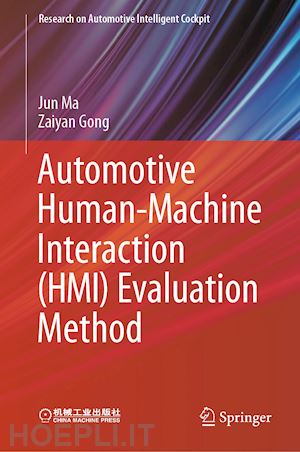

Questo prodotto usufruisce delle SPEDIZIONI GRATIS
selezionando l'opzione Corriere Veloce in fase di ordine.
Pagabile anche con Carta della cultura giovani e del merito, 18App Bonus Cultura e Carta del Docente
This book focuses on the evaluation methodology for automotive human-machine interaction (HMI), which aim to reduce driving distractions, lower operational loads, optimize user experience design, and enhance user value.
The book is divided into three parts. The first part, consisting of Chapters 1–3, introduces the evolution of automotive HMI and proposes a three-dimensional orthogonal evaluation system for automotive HMI that is comprehensive, systematic, and quantifiable. This evaluation system incorporates all evaluation items into a spatial matrix consisting of three dimensions: interaction tasks, interaction modalities, and evaluation indexes. The second part provides a comprehensive presentation and in-depth discussion of the evaluation indexes. The three rational evaluation indexes are utility, safety, and efficiency, which can be tested by the real-car driving simulator. The four emotional evaluation indexes are cognition, intelligence, value, and aesthetics. In orderto standardize the latter two subjective indexes, this book summarizes common differences in value between Chinese and European users and organizes typical aesthetic orientations in automotive UI based on art history research. The third part introduces the application of this HMI evaluation system in the automotive R&D process, including how to integrate the evaluation into a real product development process to achieve efficient product iteration.
This book is suitable for intelligent cockpit and HMI designers, engineers, and researchers. It is also used as a reference for product managers and students in the field of intelligent connected vehicles.Chapter 1. HMI and automotive HMI.- Chapter 2. Overview of automotive HMI test and evaluation.- Chapter 3. Automotive HMI evaluation system structure.- Chapter 4. Indexes of the automotive HMI evaluation system.- Chapter 5. Utility.- Chapter 6. Safety.- Chapter 7. Efficiency.- Chapter 8. Cognition.- Chapter 9. Intelligence.- Chapter 10. Value.- Chapter 11. Aesthetics.- Chapter 12. Application of the evaluation system in R&D process.
Dr. Jun Ma is Professor and Doctoral Supervisor of School of Automotive Studies, Tongji University, founder of HVR Lab, Double-Hired Professor and Doctoral Supervisor of College of Design & Innovation, Tongji University, and Founder and Director of Innovative Design and Entrepreneurship Faculty. He is Deputy Director of Intelligent Cabin Working Group of China SAE, Board Member of XuanYuan University and Judge of XuanYuan Award, and Founder of China Intelligent Cabin Award (CICA) with J. D. Power. Dr. Ma has about 30 years of research and industrial practice experience in automotive product R&D, human-machine interaction, and innovative design. He focused on the user experience of the automotive industry and improved the academic infrastructure by combining interdisciplinary cooperation and in-depth industrial practice. He proposed the concepts of “Human-Vehicle Relationship”, established the development process of DDP double-diamond process for intelligent vehicles, and created theC-HVR evaluation system. Dr. Jun Ma lived and worked in Germany for 15 years. He was graduated from Technical University Darmstadt in Germany, majoring in electronic engineering and automation.











Il sito utilizza cookie ed altri strumenti di tracciamento che raccolgono informazioni dal dispositivo dell’utente. Oltre ai cookie tecnici ed analitici aggregati, strettamente necessari per il funzionamento di questo sito web, previo consenso dell’utente possono essere installati cookie di profilazione e marketing e cookie dei social media. Cliccando su “Accetto tutti i cookie” saranno attivate tutte le categorie di cookie. Per accettare solo deterninate categorie di cookie, cliccare invece su “Impostazioni cookie”. Chiudendo il banner o continuando a navigare saranno installati solo cookie tecnici. Per maggiori dettagli, consultare la Cookie Policy.